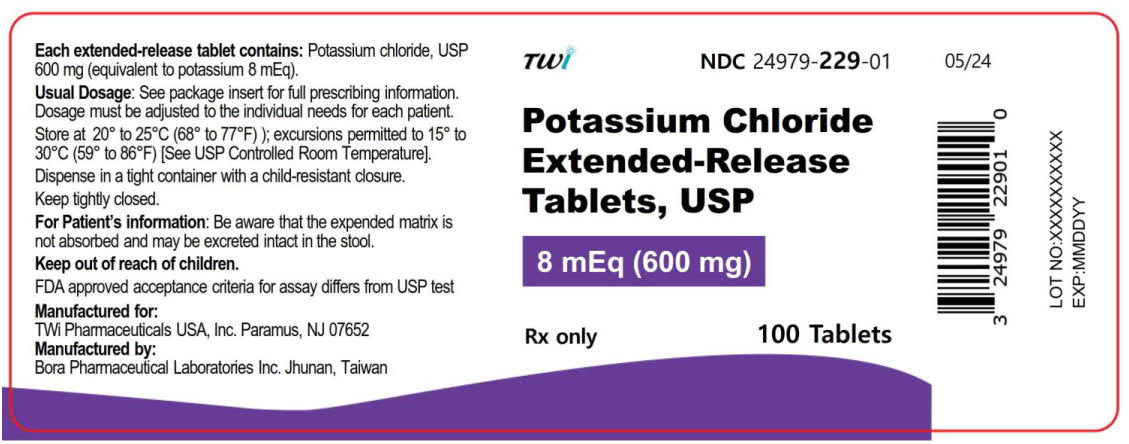Label: POTASSIUM CHLORIDE tablet, extended release
- NDC Code(s): 24979-229-00, 24979-229-01, 24979-229-03, 24979-230-00, view more
- Packager: Upsher-Smith Laboratories, LLC
- Category: HUMAN PRESCRIPTION DRUG LABEL
- DEA Schedule: None
- Marketing Status: Abbreviated New Drug Application
Drug Label Information
Updated May 5, 2025
If you are a consumer or patient please visit this version.
- Download DRUG LABEL INFO: PDF XML
- Official Label (Printer Friendly)
-
HIGHLIGHTS OF PRESCRIBING INFORMATIONThese highlights do not include all the information needed to use POTASSIUM CHLORIDE EXTENDED-RELEASE TABLETS safely and effectively. See full prescribing information for POTASSIUM CHLORIDE ...
-
Table of ContentsTable of Contents
-
1 INDICATIONS AND USAGEPotassium chloride extended-release tablets are indicated for the treatment and prophylaxis of hypokalemia with or without metabolic alkalosis, in patients for whom dietary management with ...
-
2 DOSAGE AND ADMINISTRATION2.1 Administration and Monitoring - If serum potassium concentration is less than 2.5 mEq/L, use intravenous potassium instead of oral supplementation. Monitoring - Monitor serum potassium and ...
-
3 DOSAGE FORMS AND STRENGTHSPotassium chloride extended-release tablets, USP are supplied as: 600 mg (8 mEq) are film coated, round white, tablets debossed with “T229” 750 mg (10 mEq) are film coated, round yellow, tablets ...
-
4 CONTRAINDICATIONSPotassium chloride is contraindicated in patients on triamterene and amiloride.
-
5 WARNINGS AND PRECAUTIONS5.1 Gastrointestinal Adverse Reactions - Solid oral dosage forms of potassium chloride can produce ulcerative and/or stenotic lesions of the gastrointestinal tract, particularly if the drug ...
-
6 ADVERSE REACTIONSThe following adverse reactions have been identified with use of oral potassium salts. Because these reactions are reported voluntarily from a population of uncertain size, it is not always ...
-
7 DRUG INTERACTIONS7.1 Triamterene or Amiloride - Use with triamterene or amiloride can produce severe hyperkalemia. Concomitant use is contraindicated [see Contraindications (4)]. 7.2 ...
-
8 USE IN SPECIFIC POPULATIONS8.1 Pregnancy - Risk Summary - There are no human data related to use of potassium chloride extended-release tablets during pregnancy, and animal reproduction studies have not been conducted ...
-
10 OVERDOSAGE10.1 Symptoms - The administration of oral potassium salts to persons with normal excretory mechanisms for potassium rarely causes serious hyperkalemia. However, if excretory mechanisms are ...
-
11 DESCRIPTIONPotassium Chloride Extended-release Tablets, USP are a solid oral dosage form of potassium chloride. Each contains 600 mg or 750 mg of potassium chloride equivalent to 8 mEq or 10 mEq of potassium ...
-
12 CLINICAL PHARMACOLOGY12.1 Mechanism of Action - The potassium ion is the principal intracellular cation of most body tissues. Potassium ions participate in a number of essential physiological processes including the ...
-
13 NON CLINICAL TOXICOLOGY13.1 Carcinogenesis, Mutagenesis, and Impairment of Fertility - Carcinogenicity, mutagenicity and fertility studies in animals have not been performed. Potassium is a normal dietary ...
-
16 HOW SUPPLIED/STORAGE AND HANDLINGPotassium chloride extended-release tablets, USP contain 600 mg or 750 mg of potassium chloride (equivalent to 8 mEq and 10 mEq respectively. Potassium chloride extended-release tablets, USP are ...
-
17. PATIENT COUNSELING INFORMATIONInform patients to take each dose with meals and with a full glass of water or other liquid, and to not crush, chew, or suck the tablets. Inform patients that the wax matrix is not absorbed and ...
-
Principal Display PanelPotassium Chloride Extended Release Tablets, USP, 8 mEq
-
Principal Display PanelPotassium Chloride Extended Release Tablets, USP, 10 mEq
-
INGREDIENTS AND APPEARANCEProduct Information




